Cost of Roof Insulation
Last updated 30th June, 2025
Thinking about insulating your roof but not sure where to start? Roof insulation is one of the most effective ways to improve your home's energy efficiency, reduce heat loss, and cut down on your energy bills.
Whether you’re converting a loft or just want to make your home more comfortable year-round, investing in insulation can make a noticeable difference.
But how much does it actually cost? Depending on the type of insulation and the size of your roof, you can expect to pay anywhere from £400 to £2,500.
In this guide, we’ll break down the different options, their pros and cons, and what you can expect for your budget—so you can make an informed decision with confidence.
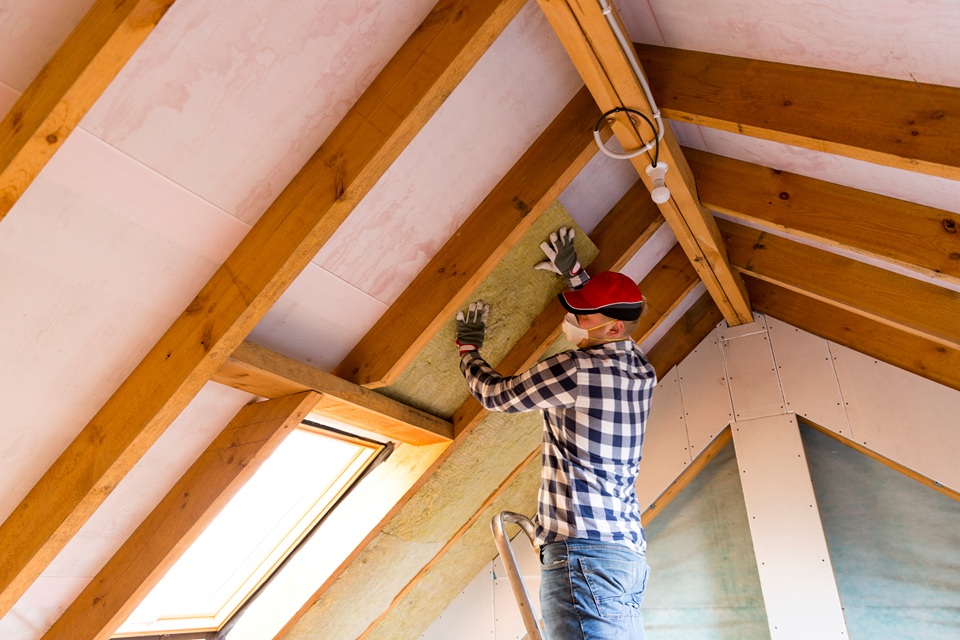
Energy bills in the UK are rising consistently, and as such, more homeowners have begun to explore different ways to improve the energy efficiency of their homes. Among the most effective ways of improving this energy efficiency is through bolstering roof insulation.
By installing more roof insulation in your home, you will reduce the amount of heat that is lost through your roof, lowering your heating costs and creating a more sustainable and thermally efficient home. In fact, research has shown that proper roof insulation can prevent up to 25% of heat loss within an uninsulated home, which makes it an incredibly worthwhile and cost-effective solution.
When it comes to the type of roof insulation you can install, there are several types to choose from, and each is designed to suit different roof structures and household needs.
For instance, warm roof insulation would be installed above the rafters, whereas cold roof insulation would be positioned between joists in the ceiling. Spray foam insulation, stiff insulation boards like EPS (Expanded Polystyrene) and PIR (Polyisocyanurate), and traditional insulation like blanket rolls and mineral wool are other very common and popular options.
Table of Contents
How Much Does Roof Insulation Cost?
All of these insulation types can be used on both flat and pitched roofs, which offers homeowners great versatility when it comes to selecting the most appropriate insulation not only for their needs but for their budget too.
On the note of budget, the cost of roof insulation will typically range from £400 to £2,500, depending on the type of insulation you opt for, the complexity of your roof and whether you opt to hire someone to complete the project for you, or complete it as DIY.
For homeowners concerned about upfront costs, there may be financial support available through schemes such as the Energy Company Obligation (ECO4) and Local Authority Flexibility (LA Flex), which aim to make energy efficiency upgrades more accessible.
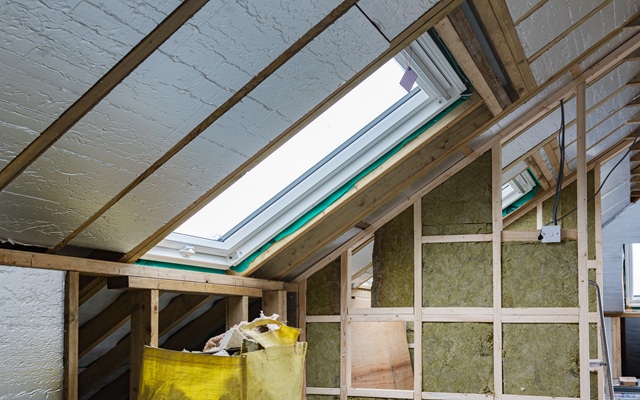
The cost of roof insulation will shift and change quite drastically depending on a number of factors. For one, the type of roof you have, pitched or flat, along with the type of insulation you opt for, will vary the total cost of insulation.
For example, an insulated pitch, a roof using a cold roof method, may cost between £400 and £800, whereas a warm roof system is more comprehensive and often ranges from £1,500 to £2,500. Flat roof insulation usually falls in the range of £1,000 to £2,000.
There are several other cost-impacting factors to consider, such as the insulation material. Cost-impacting insulation is much more expensive than mineral wool due to the easier application method and increased performance.
You should also consider the size and accessibility of your roof, as this will impact labour costs, as larger or hard-to-reach spaces typically require more time and effort to insulate. Additionally, the condition of your existing roof may mean that repairs will need to be done before the insulation can be installed, which would increase the overall cost.
While opting for DIY insulation, especially in the case of cold roofs using loft roll, can be a great way to save money and make your budget work a little harder, it’s essential to approach the task with care. Mistakes such as leaving gaps or obstructing ventilation can really damage the performance of the system, and even worse, they could lead to moisture problems.
Despite the initial outlay, properly installed roof insulation can yield significant savings over time, and according to the Energy Saving Trust, insulating an uninsulated semi-detached house can reduce energy bills by around £270 per year.
Roof Insulation Prices
| Type | Method | Small House | Medium House | Large House |
|---|---|---|---|---|
| Mineral Wool Roll | Internal (Cold Roof) | £400 | £600 | £800 |
| Rigid Foam Boards | External (Warm Roof) | £1,500 | £2,000 | £2,500 |
| Spray Foam | Internal | £1,200 | £1,600 | £2,000 |
These estimates include both material and labour costs and offer a general guide to the cost of roof insulation based on property size and insulation type.
Additional Costs
When planning the costs of your roof insulation project, it is crucial to factor in a budget for some potential additional expenses. For example, the removal of old or damaged insulation is a very common job that costs between £200 and £500, depending on the amount and size of the roof.
If you require external works on your roof, which will be required for certain types of insulation, you will need to erect scaffolding, adding between £200 and £500 to the overall bill.
Ventilation upgrades may be another necessary cost, as it is crucial to prevent condensation and damp within your roof post-installation - this costs between £100 and £300. As mentioned earlier, if your roof requires repairs, you may need to have these done before any insulation can be installed, as any leaks in the roof will ruin the performance and let moisture in.
For this, you could pay anywhere from £200 to £1,500, depending on the severity of the damage.
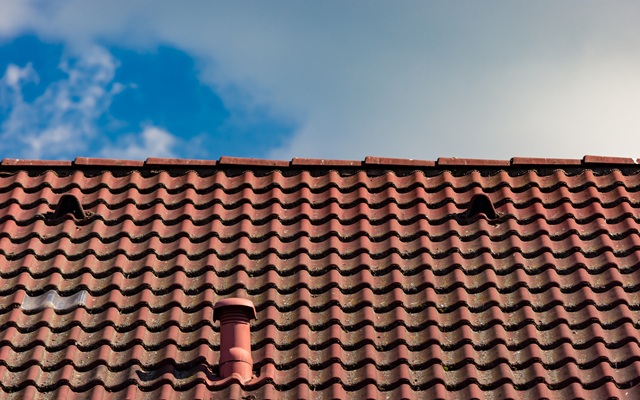
A professional energy survey, which can cost between £50 and £200, may also be advisable to identify the most cost-effective insulation strategy for your home, and in some cases, roof covering replacement may be necessary before warm roof insulation can be applied, with potential costs ranging from £2,000 to £4,000.
Fortunately, some of these costs may be partially or fully covered by schemes such as ECO4.
Cost Breakdown Calculator
To better understand the breakdown of costs associated with roof insulation, consider the following example of a medium-sized pitched roof being insulated with mineral wool:
Materials (Mineral wool loft roll)
£200
Labour (Installation by a roofer)
£400
Additional costs (Waste removal and ventilation)
£200
This example provides a useful baseline for budgeting a typical cold roof insulation project.
Labour Costs and Time Frames
If you don’t wish to install roof insulation yourself, you will need to consider the costs of labour, which can vary based on the complexity, type of insulation and size of the roof. Hiring a roofer or insulation specialist will generally cost around £150 and £250 per day. For insulation systems that are more DIY-friendly, such as loft roll in cold roofs, it may be more cost-effective to enlist a general labourer who may charge around £20 to £30 per hour.
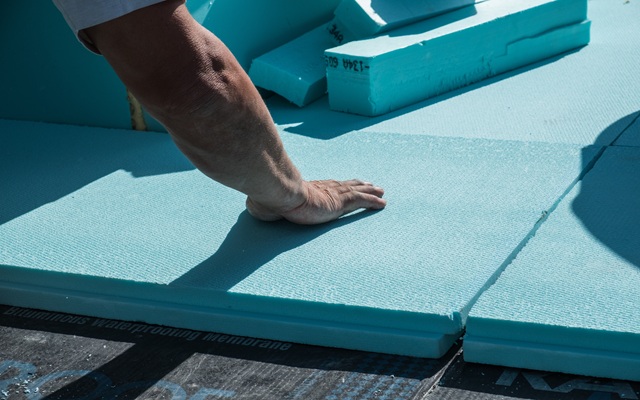
The time it will take to complete the roof insulation installation will depend on the system you opt for and the size and complexity of the roof. For example, cold roof insulation is generally straightforward and can often be completed in a single day, whereas warm roof insulation is more involved and can take from three to five days to complete.
Flat roof insulation usually takes around two to four days. Everything from roof height, accessibility, and even weather conditions can all impact the timeline of the installation, so bear this in mind when working out timeframes.
Types of Roof Insulation
There are numerous types of roof insulation that are available on the market, and each offers different benefits and price points depending on your home's energy requirements. Here they are in a little more detail:
Warm Roof Insulation
Warm roof insulation is installed above the rafters and underneath the roof covering, which makes it the ideal option for converted lofts or rooms in the roof. Warm roof insulation offers a very high thermal performance and avoids reducing loft space, though it is more expensive and involves a complex installation process. Costs typically range from £1,500 to £2,500.
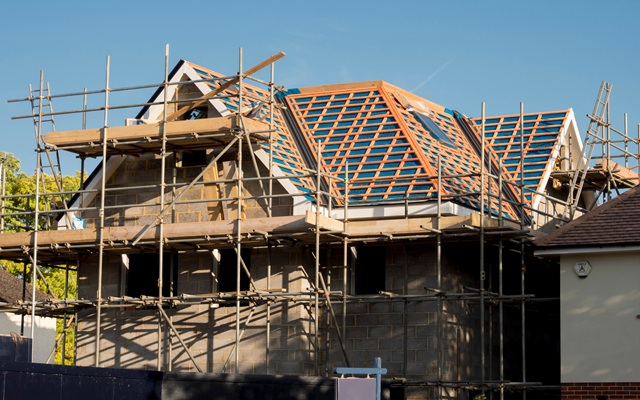
Pros:
- ✔ Excellent thermal performance
- ✔ Preserves loft space (no internal reduction)
- ✔ Ideal for converted lofts or rooms in the roof
Cons:
- ✖ Higher cost
- ✖ Complex installation process
Cold Roof Insulation
Cold roof insulation is fitted between and over the ceiling joists and is a popular choice for unconverted loft spaces.
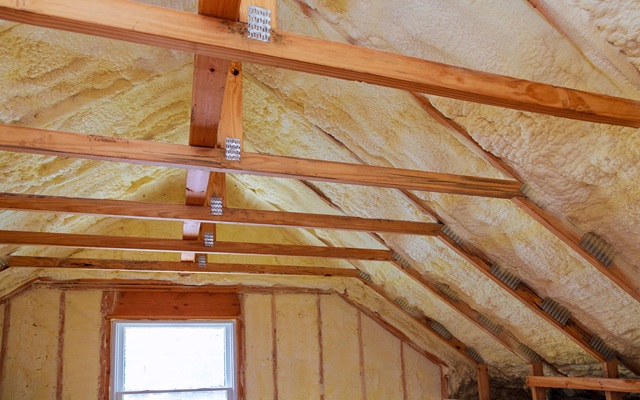
Put simply, it is easy to install and very cost-effective, with costs usually falling between £400 and £800. However, it’s less efficient if the loft space is used regularly or needs to be heated.
Pros:
- ✔ Affordable
- ✔ Easy to install
- ✔ Suitable for unconverted lofts
Cons:
- ✖ Less effective for heated or regularly used loft spaces
- ✖ May result in heat loss through the roof structure
Spray Foam Insulation
Spray foam insulation involves spraying an expanding foam into the roof voids, providing excellent thermal coverage and airtightness. It generally costs between £1,200 and £2,000.
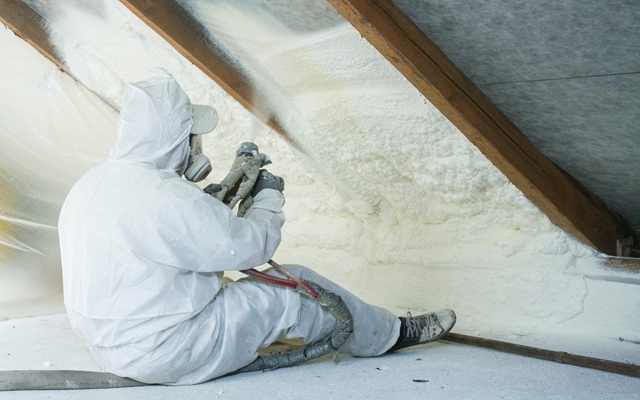
While spray foam is quick to apply and highly effective, it can lead to ventilation issues if not installed properly.
Pros:
- ✔ Provides excellent airtightness and thermal performance
- ✔ Quick to apply
- ✔ Fills gaps and irregular spaces effectively
Cons:
- ✖ Potential ventilation issues if not installed properly
- ✖ Relatively expensive
- ✖ May reduce property saleability if buyers are wary of it
Rigid Board
Rigid foam boards, including PIR and EPS types, are durable and suitable for flat roofs and warm roof systems. They cost around £40 to £60 per square metre and are space-efficient but require careful and accurate installation.
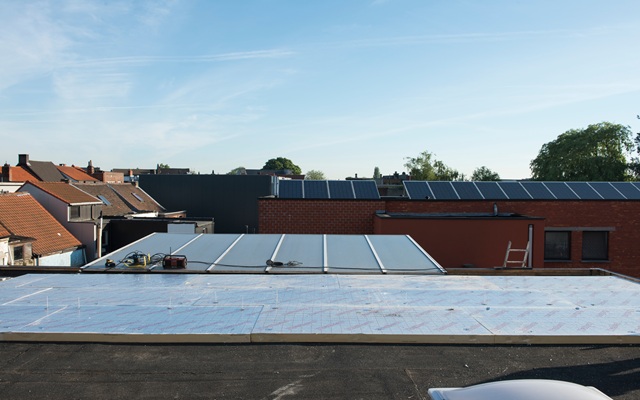
Pros:
- ✔ Space-efficient (thin yet highly insulating)
- ✔ Durable and moisture resistant
- ✔ Ideal for flat roofs and warm roof systems
Cons:
- ✖ Requires precise installation
- ✖ Expensive
Mineral Wool
Mineral wool insulation comes in rolls and is placed between joists. It is one of the most cost-effective options, costing between £5 and £10 per square metre. However, it can be irritating to handle and may compress over time, reducing its effectiveness.
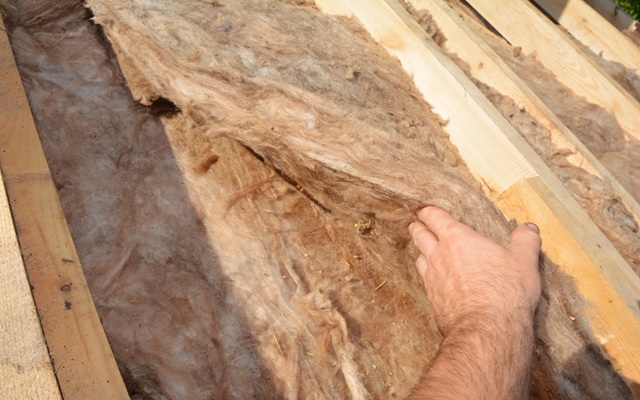
Pros:
- ✔ Very cost-effective
- ✔ Widely available and easy to install in joist spaces
- ✔ Good sound insulation
Cons:
- ✖ Can be itchy/irritating to handle
- ✖ May compress over time, reducing thermal efficiency
Multifoil
Multifoil insulation consists of thin reflective layers and is lightweight and easy to install. It typically costs between £7 and £15 per square metre. However, in colder areas, it usually needs to be combined with other forms of insulation to achieve adequate thermal performance.
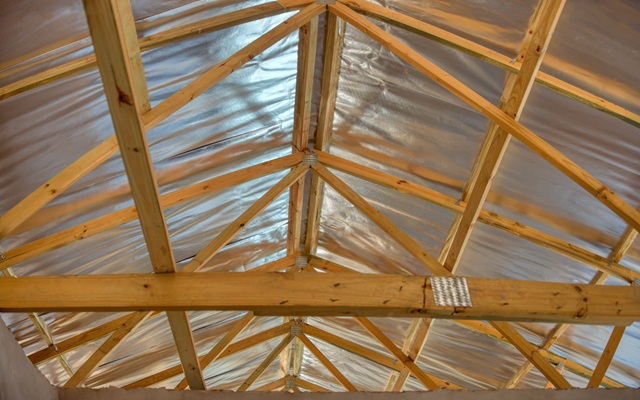
Pros:
- ✔ Lightweight and easy to install
- ✔ Reflects radiant heat effectively
- ✔ Minimal thickness compared to other materials
Cons:
- ✖ Typically needs to be combined with other insulation in colder areas
- ✖ Less effective on its own in extreme temperatures
DIY Roof Insulation vs Professional Installation
A key decision in your roof insulation project will be whether you attempt to complete it as a DIY task or whether you call in the experts - there are pros and cons to both.
DIY roof insulation is most practical for cold roof systems using mineral wool, as this method is fairly straightforward and requires tools commonly found in a simple DIY toolbox, such as a utility knife, gloves, goggles, and a dust mask. It’s essential to take care not to block ventilation gaps or cover electrical wiring when installing insulation.

Professional installation is highly recommended for more complex systems like warm roof insulation, spray foam, and rigid board systems, as professionals ensure that the installation complies with current Building Regulations and safety standards. Hiring a qualified installer also typically comes with the added benefit of warranties and improved long-term performance.
To illustrate the difference in costs, a DIY loft roll project might only require a £200 outlay for materials, whereas the same job completed by a professional could cost between £600 and £800, depending on labour and additional services.
Compliance and Regulations
In the UK, there are Building Regulations that lay out the minimum standards for insulation and energy efficiency for homes. For pitched roofs, the u-value is set at 0.16 W/m2K, which generally equates to the installation of insulation at a thickness of at least 270mm when installing mineral wool as an example.

Compliance also involves ensuring adequate ventilation to prevent condensation build-up and fire safety regulations that dictate the use of non-combustible materials. If your insulation project involves significant structural changes or external modifications to the roofline, you may also need planning permission, which you can obtain from the council at a cost between £258 and £462.
Grants and Schemes
Energy efficiency and roof insulation are a hot topic for the UK government at the moment as they continue their quest to achieve net zero by 2050. As such, UK homeowners may be eligible for financial assistance through several government-backed schemes.
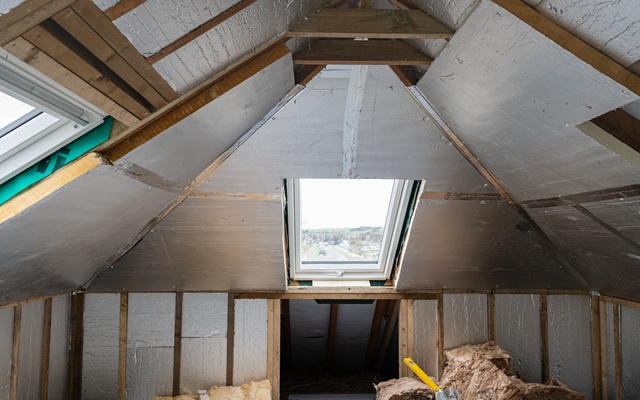
The Energy Company Obligation (ECO4) and Local Authority Flexibility (LA Flex) schemes are designed to support low-income households and those in energy-inefficient homes, and the Home Upgrade Grant (HUG) also provides targeted support for insulation and energy improvements.
Cost of Removing Roof Insulation
There are a number of reasons why you may need to remove old roof insulation, from moisture damage to pest infestations, and even outdated materials that may contain asbestos. DIY removal is possible and can save money, but it’s crucial to take safety precautions.
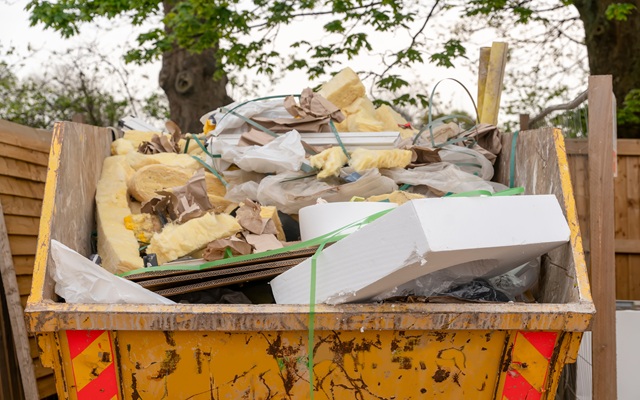
Always wear protective gear and be careful when handling old materials, and if you think that the insulation may contain harmful materials like asbestos, leave it to a professional. Professional removal services typically cost between £200 and £500.
FAQs
Finding and Hiring a Professional
Nowadays, it's really easy to find a professional tradesperson to work on your home due to the massive amount of resources available online. Start with Google and PriceYourJob.co.uk, where you can find all sorts of reviews, ratings, services and contact information.
Word of mouth can also never be underestimated when it comes to finding services for your home. Personal recommendations are unbiased, and you can make them directly through social media platforms like Facebook.
An important thing to note is to get more than one quote. Don’t just settle for the first price you receive, as you may find another tradesperson that can offer a more competitive rate or that you can click with a little better. It won’t take long to get 4-5 quotes using the tips above, so make sure you’re not paying more than you need to.









